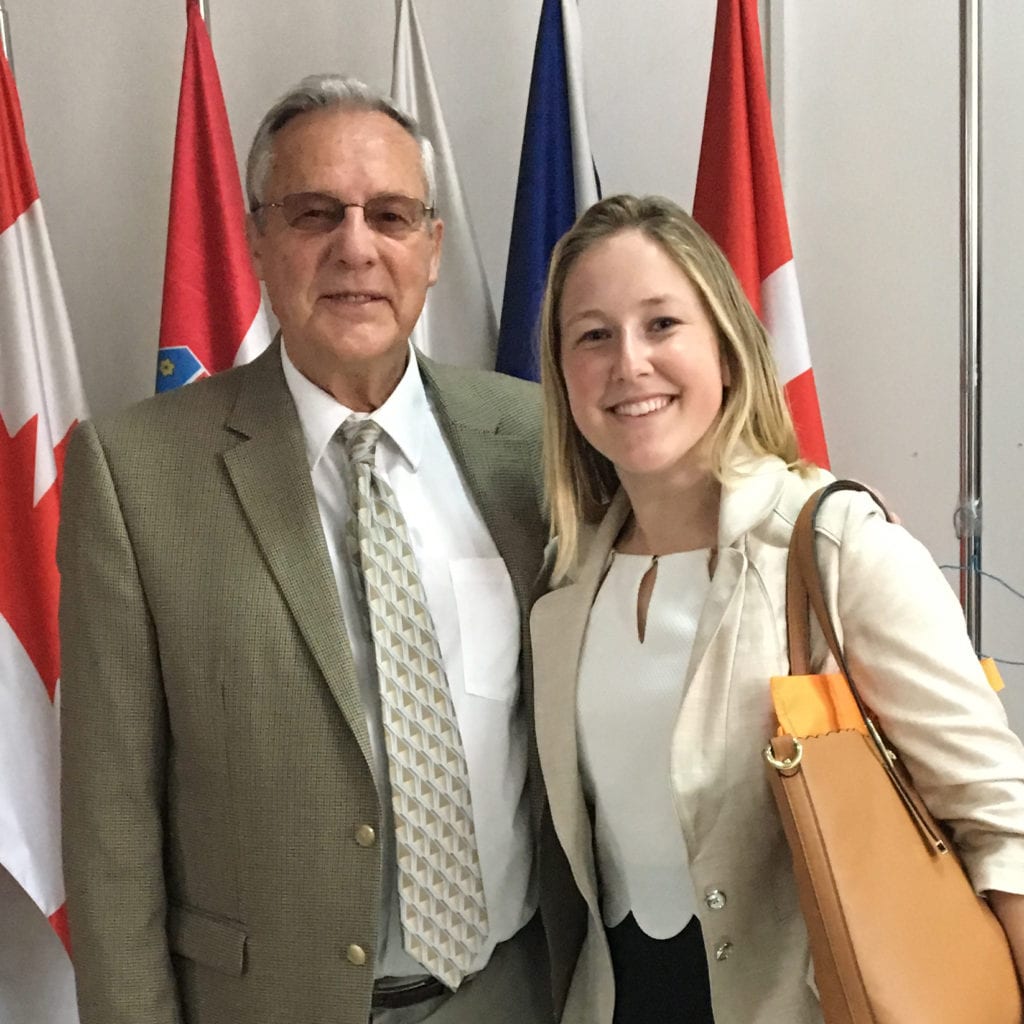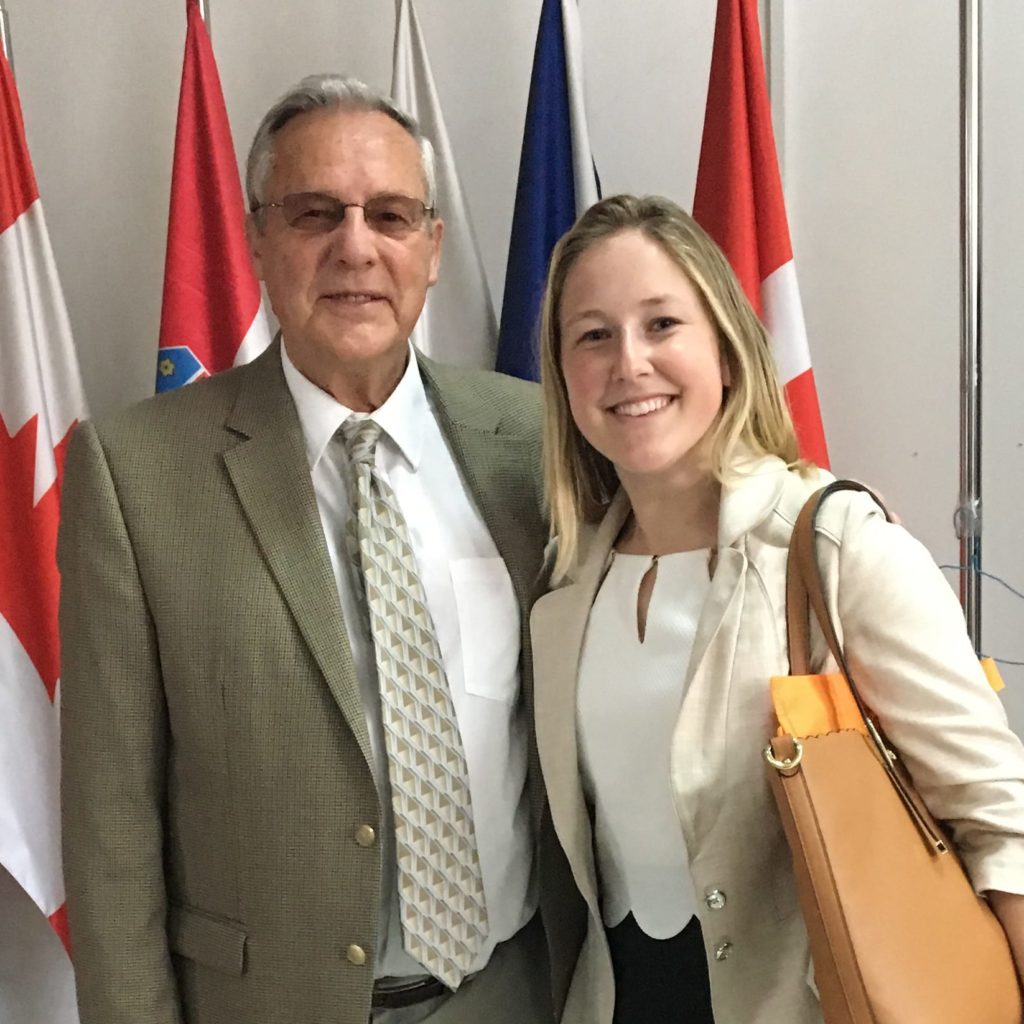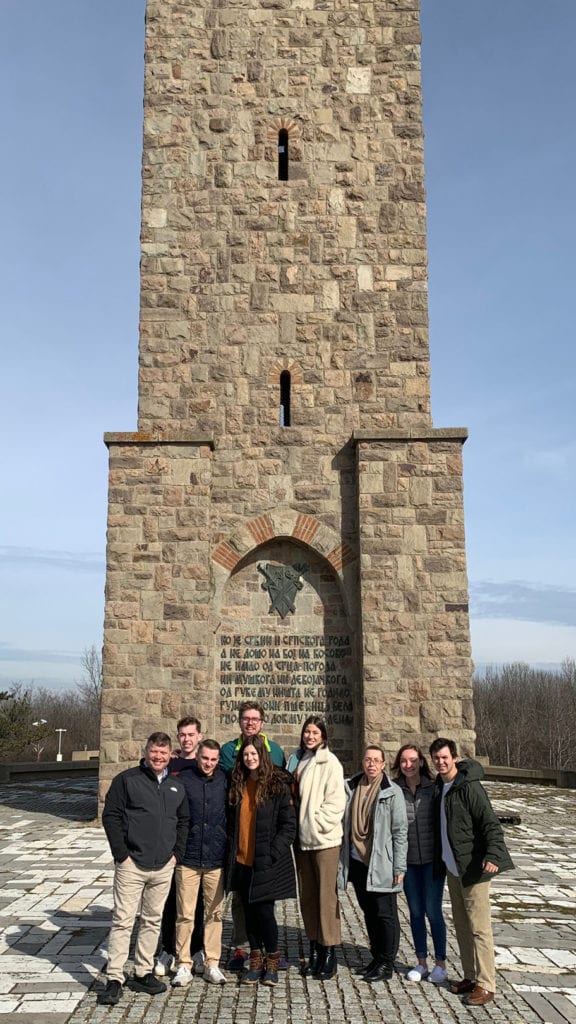Clemson University Balkans Foundation creates new scholarship endowment designed to aid students with global politics focus

It would be hard for any faculty member to argue that Drayton Wade did not get the most out of his study abroad experience in the Balkans. Wade, a political science major who graduated in 2013, was exposed to many different perspectives during the trip including those of current and former officials, ambassadors and representatives from the many groups and ethnicities that exist in the region.
He said the experience truly brought his field of study to life. It cemented his desire to work internationally, and during a networking event between program alumni and those preparing to participate, Wade met his wife.
Wade is now senior director for UiPath, a computer software company based in New York that works with clients internationally. He also serves as President of the Clemson University Balkans Foundation, which he started with other alumni of the program in order to give back to the program and its students.

The new Vladimir Matic Global Politics Endowment is named for the former career Yugoslav senior diplomat and current Clemson University senior lecturer who leads the Summer in the Balkans program and helps coordinate the Spring in Belgrade study abroad program for the Clemson University Department of Political Science. Wade said the endowment is the foundation’s way of honoring the department and Matic’s work, but it also exists to ensure students who are focused on global politics get the aid they need to pursue a program that has been meaningful for hundreds of students over the past 15 years.
“I know that the program has been a great benefit and altered the career trajectory of many alumni including me,” Wade said. “My experience at Clemson taught me that political science isn’t just politics. It’s studying how people organize and govern themselves, how they interact, how interests compete and work together and how powerful it is as a field studying human behavior and emotional intelligence. The Balkans program brings all of those aspects together and clarifies them for students. It certainly did for me.”
Wade is not alone in his appreciation for the program. Elizabeth Boylan, a 2008 graduate who majored in global politics and now serves as chairman and co-founder of the Balkans Foundation, was among the first group of students to participate in the study abroad program.
At the time, the 30-day trip was centered on Serbia. Boylan said the trip served as an immersive study in transitioning democracies, diplomacy and negotiating across cultures, and that the experience with Matic was so enlightening that it motivated her to take on a heavier course load the following semester so that she could learn more about diplomacy.

Boylan has built a presence in D.C. for Solvay, a 150-year-old, Belgian-based advanced material and chemical company, as the D.C. Liaison and Senior Advisor for their North America Government Affairs team. She maintains relationships with government officials and the diplomatic community on behalf of her company. She said many of the core values and tools she learned from Matic and the study abroad program helped her throughout her career. She credits much of her skills as a negotiator and her understanding of culture and intercultural communications to that trip and related coursework.
“I was amazed by the advanced understanding of U.S. politics by the Serbian students who had never been able to leave their country, which was the size of the state of South Carolina,” Boylan said. “It inspired me to focus on our domestic politics and volunteer for a presidential campaign, which led me to D.C., and the rest is history.”
I love my students and want them to get the best education, and in today’s world a complete education includes international elements that guarantee success in a globalized world. I think that direct exposure to the world, travel and contacts with other nationals makes a program truly valuable, so I started a summer study abroad program in 2006 that has obviously grown and been appreciated by many students.
Students are not the same after this experience; they develop a deeper understanding of the world and our place in it. They come back self-confident and with higher goals for their further education and in life, and many gain friends that they will keep the rest of their lives. The Balkans Foundation is the result of years of these connections being made, and this endowment is the next step. It is great recognition of my work and, more importantly, it is a major step in ensuring these programs continue for years to come.
Vladimir Matic
Lindsay Bryda, a 2019 Clemson graduate who participated in the 2016 study abroad program, is a member of the Balkans Foundation board of directors. She said the Balkans program opened her eyes to the importance of diplomacy and allowed her to turn a semester’s worth of lectures and reading assignments into a working knowledge base for discussions with diplomats and government leaders. She said the program served as her introduction to European politics and transatlantic relations, which exposed her to some of the nuances and complexities that make security issues compelling to study.
“The Balkans are a beautiful region with a rich history, and it’s such a shame that often only the dark chapters are remembered,” Bryda said. “I have so much respect for Professor Matic for showing students all of these features. After graduation, I returned to Bosnia and Herzegovina on a Fulbright grant. Without this experience, I would not have pursued a career in international security.”
According to Wade, nearly 40% of the alumni from the Balkans program have gone on to receive graduate degrees from a wide variety of top programs including those from Yale Law, Harvard Medical School, the Medical University of South Carolina, the London School of Economics, the University of Chicago and NYU.

The Balkans program was in full swing when Jeffrey Peake, chair of the Department of Political Science, became a faculty member at Clemson in 2011. Peake said it was Matic’s passion for the program that made him realize how important the study abroad program was for students in the department, and Peake later worked with Matic to establish the full, semester-long program in Belgrade that kicked off in 2015.
Peake said he has admired the alumni involvement that led to the Balkans Foundation, which he said has added tremendous value for Clemson students in the form of guest speakers and visits from foreign ambassadors. Peake said the new endowment named in honor of Matic represents the next step in the evolution of the foundation. He said the direct support the endowment will provide to individual students who might not otherwise be able to participate in study abroad programs is evidence of the impact Matic has made on so many students over the years.
“These study abroad programs have helped our students become global citizens and directly influenced the trajectory of their careers,” Peake said. “I count myself among people who would have gone without experiences and enrichment if it weren’t for [Matic]. So much is theoretical until you actually engage in it, so thinking about the kind of growth I’ve experienced through these programs multiplied by all the alumni who have engaged in them over the years is proof of their value.”
To donate directly to the Vladimir Matic Global Politics Endowment, click here.
The Department of Political Science is part of the University’s College of Behavioral, Social and Health Sciences (CBSHS). Established in July 2016, CBSHS is a 21st-century, land-grant college that combines work in seven disciplines – communication; nursing; parks, recreation and tourism management; political science; psychology; public health sciences; sociology, anthropology and criminal justice – to further its mission of “building people and communities” in South Carolina and beyond.
The post Clemson University Balkans Foundation creates new scholarship endowment designed to aid students with global politics focus appeared first on Clemson News.
Click Here for the Full Article
Author: Michael Staton







